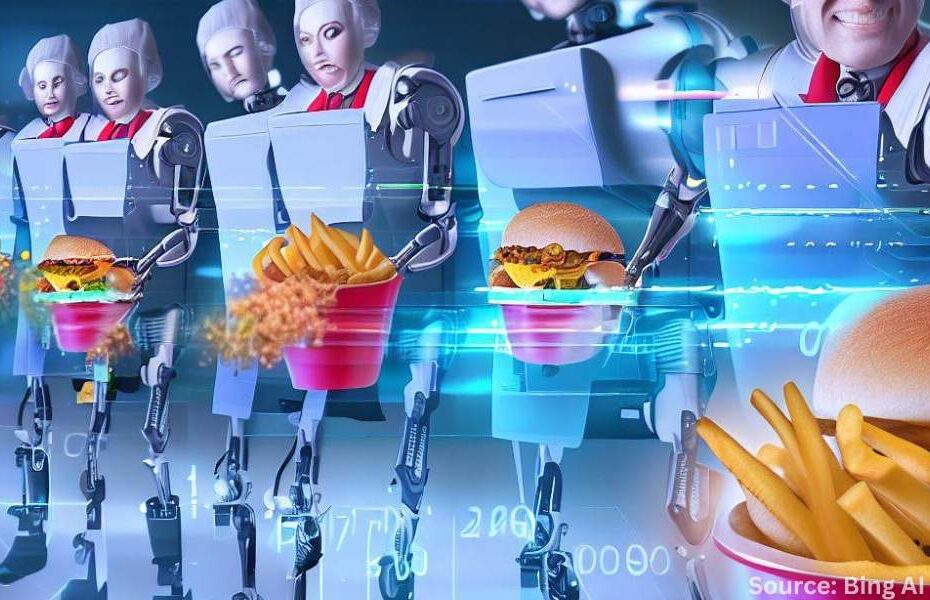Within five to ten years, robots and computer kiosks will be able to replace the majority of fast food jobs, which would result in millions of job losses, according to an AI entrepreneur.
‘This is definitely a watershed moment for artificial intelligence,’ Valyant AI founder Rob Carpenter told Fox News.
‘We are going to see AI jump from back-office processing and manufacturing facilities to consumer-facing, front-facing, traditionally human-only jobs.’
Taco Bell, McDonald’s, Chipotle, Popeyes, Domino’s, and Wingstop are just a few of the fast-food restaurants that have already started using AI.
This month, Wendy’s and Google started working together to “use artificial intelligence to revolutionise the drive-thru experience.”
To interact with clients and collect purchases, a trial programme will make use of Google Cloud’s AI.
According to Carpenter, the bulk of roles in restaurants will likely be automated within the next five to ten years by a variety of different technology companies.
Carpenter claims that Valyant AI also created the Holly drive-through AI platform, which can outsell human salespeople.
Carl’s Jr. and Hardee’s are already using Holly, which has already handled over a million drive-through orders.
Carpenter claimed that AI is already enabling the automation of food orders placed through self-service computer kiosks, enabling robots to cook meals, and expediting payment processes for consumers using mobile devices.
‘What we see is that humans on average will upsell about 50% of the time,’ Carpenter said.
‘Valyant upsells about 200% on average.’
‘They can add items to their order, they can modify items, they can remove items,’ he added.
‘Holly will roll with all of that.’
In a report published on March 26, Goldman Sachs forecasted that the development of AI might eliminate or reduce 300 million employment.
According to the report, it might lead to a “significant disruption” in all labour markets worldwide.
Carpenter claimed that Holly and other AI programmes will take over a number of positions that fast food chains are unable to fill.
According to the National Restaurant Association, over two-thirds of restaurant owners believe there won’t be enough staff to handle demand.
‘The order-taking position is one of the least desirable positions within fast food restaurants,’ Carpenter told Fox News.
‘That should just be a job that a robot can do because it’s basic and it’s automated.’
‘It doesn’t matter if it’s 8 a.m. or 2 a.m., the AI still sounds chipper and she never forgets those upsells,’ he said.
Top AI leaders, including Sam Altman, CEO of OpenAI, raised the “risk of extinction from AI” on Tuesday together with experts and academics.
In a statement published by the nonprofit Centre for AI Safety (CAIS), more than 350 signatories declared that “mitigating the risk of extinction from AI should be a global priority alongside other societal-scale risks such as pandemics and nuclear war.”
Along with Altman, they also included officials from Microsoft and Google and the CEOs of DeepMind and Anthropic, two AI companies.
Among them were professors from universities ranging from Harvard to China’s Tsinghua University, as well as Geoffrey Hinton and Yoshua Bengio, two of the three ‘godfathers of AI’ who shared the 2018 Turing Award for their work on deep learning.
Yann LeCun, the third godfather of AI, works at Meta, which was singled out by CAIS for not signing the letter.
The letter was delivered on the same day that the U.S.-EU Trade and Technology Council met in Sweden, where officials are anticipated to discuss AI regulation.
The first to mention possible threats to society were Elon Musk and a group of AI researchers and business executives in April.
Supporters claim that recent advancements in AI have produced tools that can be applied to everything from legal brief writing to medical diagnosis.
This has generated worries that the technology may result in invasions of privacy, propaganda efforts against the government, and problems with “smart machines” thinking for themselves.
Hinton previously told Reuters that artificial intelligence (AI) might be more urgent than climate change as a threat to civilization.
The CEO of OpenAI, Sam Altman, threatened to quit Europe last week and referred to EU AI, the first attempt to build a regulation for AI. After receiving criticism from legislators, he quickly changed his position.
In publishing and graphic design, Lorem ipsum is a placeholder text commonly used to demonstrate the visual form of a document or a typeface without relying on meaningful content.
